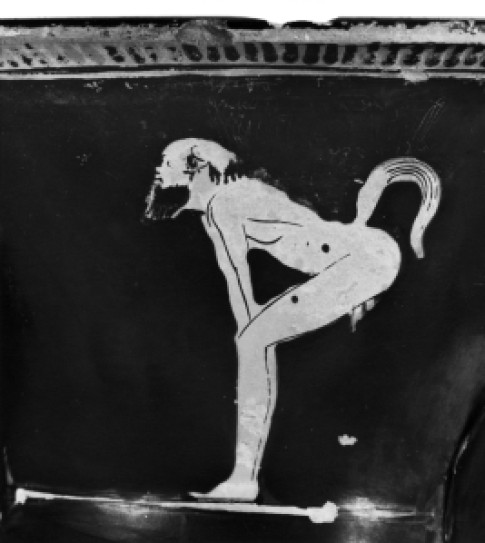Homer, Odyssey, 20.68–69
“…And glorious Aphrodite cared for them
With cheese and sweet honey and pleasing wine.”
…..κόμισσε δὲ δῖ᾿ Ἀφροδίτη
τυρῷ καὶ μέλιτι γλυκερῷ καὶ ἡδέι οἴνῳ·
Xenophanes, fr. 1.9-10
“…and fine tables
Heaped up with cheese and thick honey.”
…γεραρή τε τράπεζα
τυροῦ καὶ μέλιτος πίονος ἀχθομένη·

Literary Papyri, fr. 59 [LCL 360] Anonymous
“There was some cheese. I took it”
….τυρὸς ἦν τις· ἔσπασα
Teleclides, fr. 27
“…to sip honey sweet wine
From a fragrant cup
While snacking on cheese.”
καὶ μελιχρὸν οἶνον ἕλκειν
ξ ἡδύπνου λεπαστῆς,
τυρίον ἐπεσθίοντα.

Euripides, Cyclops, 226
“My buckets of cheese are all mixed up!”
τεύχη τε τυρῶν συμμιγῆ…
Cratinus, fr. 136
“Once I laid down alongside cheese and mint and olive oil…”
τυρῷ καὶ μίνθῃ παραλεξάμενος καὶ ἐλαίῳ.
Antiphanes, fr. 51
“Do you get it? I am talking about cheese”
μανθάνεις; / τυρὸν λέγω.
Aristophanes, Wasps 956
“What’s the use, then, if he eats the cheese?”
τί οὖν ὄφελος, τὸν τυρὸν εἰ κατεσθίει;
Eupolis, fr. 361
“Oh, my cheese is hollowed out and gone….”
ὡς οἴχεται μὲν τυρὸς ἐξεγλυμμένος.

Hippocrates of Cos, On Ancient Medicine, 20.48
“It is not enough to consider only whether cheese is a bad food, since it provides pain to someone who has eating too much of it. Instead, we need to figure out what the pain is, what causes it, and what part of a person is harmed. There are many other harmful foods and wicked drinks that impact a person in different ways. I would summarize it in this way: “Unmixed wine, when consumed too much, creates a specific effect.” Everyone knows that this is an aspect of wine and that wine is to blame intrinsically and we know what parts of a person’s body are susceptible to these effects.
I wish to bring this kind of truth to light about other things too. Cheese, to use my current example, doesn’t affect all people the same. Some people can gorge themselves on it with no pain and those people gain amazing strength from it. Others don’t do so well. So, the constitutions of these people are different and the difference resides in the part of the body that is inimical to cheese and is irritated and compelled to act upon its appearance. Those who have this humor in their body in greater amounts and with greater influence over their body will naturally suffer more. Yet if cheese were a bad food for the human body universally, then it would hurt everyone. Whoever knows these things true, will not suffer the rest.”
καὶ μὴ ἁπλῶς οὕτως· πονηρόν ἐστιν βρῶμα τυρός. πόνον γὰρ παρέχει τῷ πληρωθέντι αὐτοῦ, ἀλλὰ τίνα τε πόνον καὶ διὰ τί καὶ τίνι τῶν ἐν τῷ ἀνθρώπῳ ἐνεόντων ἀνεπιτήδειον. ἔστι γὰρ καὶ ἄλλα πολλὰ βρώματα καὶ πόματα πονηρά, ἃ διατίθησι τὸν ἄνθρωπον οὐ τὸν αὐτὸν τρόπον. οὕτως οὖν μοι ἔστω οἷον· οἶνος ἄκρητος πολλὸς ποθεὶς διατίθησί πως τὸν ἄνθρωπον· καὶ πάντες ἂν οἱ εἰδότες τοῦτο γνοίησαν, ὅτι †αὕτη δύναμις οἴνου καὶ αὐτὸς αἴτιος·† καὶ οἷσί γε τῶν ἐν τῷ ἀνθρώπῳ τοῦτο δύναται μάλιστα, οἴδαμεν. τοιαύτην δὴ βούλομαι ἀληθείην καὶ περὶ τῶν ἄλλων φανῆναι.
τυρὸς γάρ, ἐπειδὴ τούτῳ σημείῳ ἐχρησάμην, οὐ πάντας ἀνθρώπους ὁμοίως λυμαίνεται, ἀλλ᾿ εἰσὶν οἵτινες αὐτοῦ πληρούμενοι οὐδ᾿ ὁτιοῦν βλάπτονται, ἀλλὰ καὶ ἰσχύν, οἷσιν ἂν συμφέρῃ, θαυμασίως παρέχεται. εἰσὶ δ᾿ οἳ χαλεπῶς ἀπαλλάσσουσι. διαφέρουσιν οὖν τούτων αἱ φύσιες. διαφέρουσιν δὲ κατὰ τοῦτο, ὅπερ ἐν τῷ σώματι ἔνεστι πολέμιον τυρῷ καὶ ὑπὸ τούτου ἐγείρεταί τε καὶ κινεῖται· οἷς ὁ τοιοῦτος χυμὸς τυγχάνει πλείων ἐνεὼν καὶ μᾶλλον ἐνδυναστεύων ἐν τῷ σώματι, τούτους μᾶλλον καὶ κακοπαθεῖν εἰκός. εἰ δὲ πάσῃ τῇ ἀνθρωπίνῃ φύσει ἦν κακόν, πάντας ἂν ἐλυμήνατο. ταῦτα δὲ εἴ τις εἰδείη, οὐκ ἂν πάσχοι τάδε.

Epicurus, according to Diogenes Laertius, Epicurus 11
“Send me a little bowl of cheese so that I can fill my belly whenever I like.”
πέμψον μοι τυροῦ,” φησί, “κυθριδίου, ἵν᾿ ὅταν βούλωμαι πολυτελεύσασθαι δύνωμαι.”











